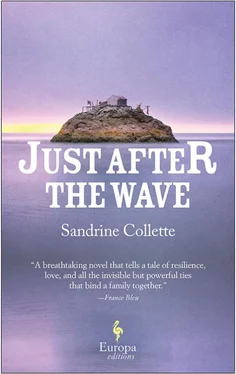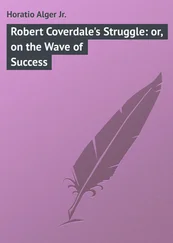Madie didn’t jump.
She just felt, very faintly, something tearing inside, right to the vibration in her body, part of her on the boat with six children, part of her staying on the island with the other three.
But this is nonsense: nothing stayed on the island, she knows that very well. What is the point of tearing herself apart, tossing her soul onto the shore to protect her little children? There is no point, none at all. To find comfort. To put a bit of balm on her heart, which does nothing to ease either the horror being born inside her, or her silent sobs. In a few hours the children, back there, will find out that they are alone.
* * *
Back to the burning, the one deep in her guts. The little girls woke up with the daylight, the sun already pounding on the sea and the overloaded boat rocking and slowly moving forward. Of course they asked where Louie and Perrine and Noah were. Madie answered. At home, she said. We’ll go back and get them afterwards.
“Oh, I see,” murmured Emily.
“I’m hungry,” whispered Sidonie.
Liam and Matteo, on the other side of the pile of belongings, also heard.
Madie would have liked for someone to worry, to ask questions, to shout. To make Pata turn around, build a tower on the boat, with different levels so they could put the little children everywhere, and she, the mother, would get that torn, painful part of herself back. She’d give the ocean a beating, she’d wave her fists in a threat. Quiet. Sit —as if she were giving orders to a dog.
No one asks any questions.
Madie waits, thinks she’s about to scream, But aren’t you going to ask why? Aren’t you going to say you’re not okay with this?
I’m not okay with this.
“What are we going to eat?” says Sidonie again, tugging on her sleeve.
* * *
So she had to resign herself, and stay on the boat, gliding across the sea with six children who don’t ask why. Madie has withdrawn into herself. Sometimes she looks around—but there’s nothing to see but water, and now that their island has disappeared, there’s really nothing, just the ocean as far as the eye can see, no trees, no stones to break the surface, no rooftop to make you think you could hang onto it. Madie supposes they are crossing the plain— God, she thinks, stiffening, we’re no further than that, in the car it took less than half an hour. Tomorrow, when they sail over what used to be the Duens hill, maybe they’ll see a little vegetation; for the time being she turns pale imagining the fathoms of water below them, ten or twenty or thirty, bottomless pits, abysses. The eddies she can sometimes sense, when the muddy sea makes ripples, and Pata, with one word, instructs Liam to avoid them.
The boat is so heavy that the water is level with the gunwale when there’s a swell. Madie wishes they could go faster, the ocean oppresses her, getting her hands wet, she places them in her lap. Her legs hurt, she turns from left to right to shift her weight. The little girls stand next to her and fidget, feeling numb.
“Careful,” says Madie.
“When will we get there?” chimes Lotte.
“I need to have a wee-wee,” moans Sidonie.
So the mother takes the little girl and holds her up over the side of the boat, terrified that some clumsiness might make her let go. But the little girl laughs out loud, bare-bottomed, wriggling, chirping and gurgling when a little wave splashes her. Stop it , says Madie, panicking, do you think it’s easy to keep hold of you , the boat leans to one side. And then the others grow impatient.
“Me too, me too!”
And one by one the mother removes their undies, faint with fear, while they giggle and wiggle, Again! shouts Sidonie when they’ve all had a turn, but this time Madie looks at her sternly.
“No, you don’t need to go anymore.”
They sit back down, time passes slowly when there’s nothing to do. Madie brought a deck of Happy Families and for a while they play, sometimes distracted by the movement of the water, or a sound they think they hear. Because Madie is stunned by the silence around them, only the breath of the wind fills the air, and the oars dipping in and out of the water at regular intervals, and the boys’ labored breathing—over there beyond their belongings and their supplies, Madie knows from those sounds that they are still pulling hard. From time to time they let the boat drift to rest their arms for a few minutes, and the seepage of the wind wraps itself around them like a frightening mist, a sort of faraway chant, and the mother listens as closely as she can, she’s already white, oh she doesn’t like this dull whistling, it’s not honest, it’s not clear.
When Sidonie lets out a cry, she gives a start.
“Look at the fish!”
Madie turns her head, dubious. The long undulating back circling around the boat makes her raise her eyebrows, a huge creature, four or six feet from head to tail, she can feel a shiver run through her arms. They’ve all seen it, the boys stood up on the other side of their pile of belongings when they heard Sidonie, and the boat rocks, and Pata ordering them to sit back down doesn’t help matters, because he too has stood up to have a look, and his eyes meet Madie’s, and she whispers, “What is it, what is that thing?”
He shrugs, but goes on rowing. Only the mother notices the slight loss of rhythm to his gestures, a kind of hesitation or precaution, yes, that’s it, the father is being careful, eventually he keeps one oar in the air and orders Liam to do likewise. The boat glides soundlessly, slow and solid. Beneath the water, the beast follows, flashing black in their wake. It is following them, that much is sure.
“But what does it want?” cries the mother, trembling, suddenly alarmed.
The father raises his hand imperiously: Sshh. Motions to Liam. They give a stroke of the oars, just once. The boat moves forward. The excited children ask questions all at the same time, looking to one side and then the other, searching the surface of the water with their shining eyes, and the mother would like to scold them, to scream but don’t you know it’s dangerous? Yes, to argue with them, very loudly, it would do her good, it would chase away her fear for a few moments.
“Enough!” orders Pata, exasperated.
They sit down, confused. The mother’s throat feels as tight as if someone were trying to strangle her. She senses the imperceptible wave of the beast swimming beneath the boat, brushing it with the top of its back and making an infinitesimal twisting motion, it can be nothing else, the sea around them is smooth, not a ripple, just this tiny, terrifying displacement of the water which goes with them and will not leave them; the father does not dare paddle. Gradually the boat slows and stops. What shall we do, murmurs the mother. Silence, all of them. Liam, Matteo and the father stare out at the water.
“There it is!” exclaims Matteo.
“ It? ”
“The monster!”
Madie shudders. To her it seems that the boat is rocking harder and harder. And the father is doing nothing! What is the point of standing there motionless if it’s just to be food for the fish, you might as well row for all you’re worth, maybe the beast will get fed up, maybe it will go back to its lair without disturbing them—but for that to happen, Pata has to regain his wits, instead of this panicky, immobile stare, so Madie suddenly cries out:
“Get a move on, what are you waiting for!”
They all give a start, it is as if she has roused them from a wicked spell, she spreads her arms wide in urgency.
“Row! Row!”
Liam plunges his oar into the water at the same time as his father, twisting his torso in an effort that elicits a grunt. They encourage him, loudly, Go on, go on . The inertia of the heavily laden craft is enough to drive the mother crazy, she leans forward as if that could help them pick up speed, her jaws clenched fit to break her teeth, if she had a whip, god knows she would use it right then, and she pulls Lotte and Marion closer, her babies, her treasures. The beast cannot be seen for the strokes of the oars and the waves they make, the spray everywhere, the creature is invisible or has slipped away, the mother begins laughing, it’s her nerves, she’s laughing with tears in her eyes, and she stammers, “It’s gone now, isn’t it?”
Читать дальше












